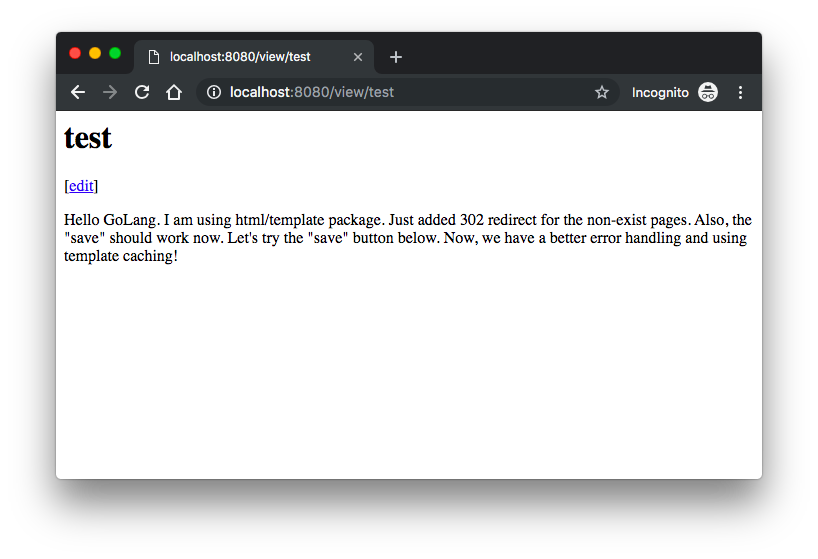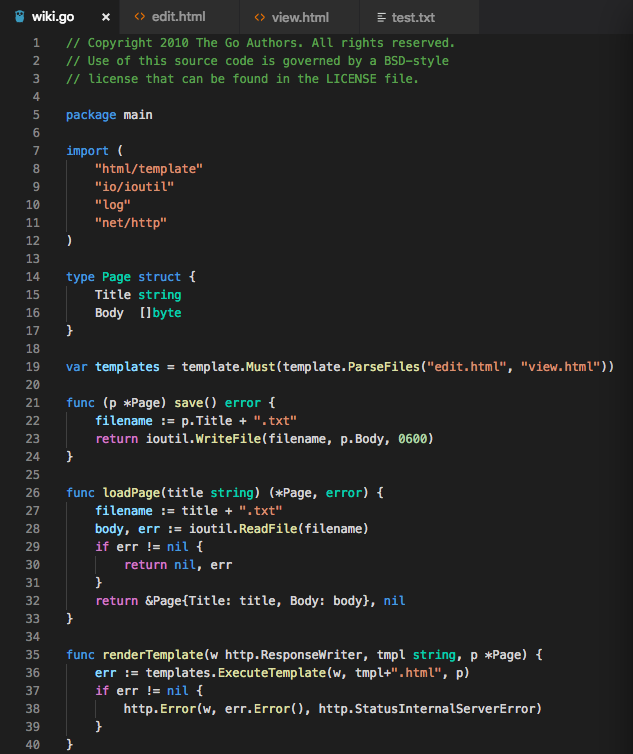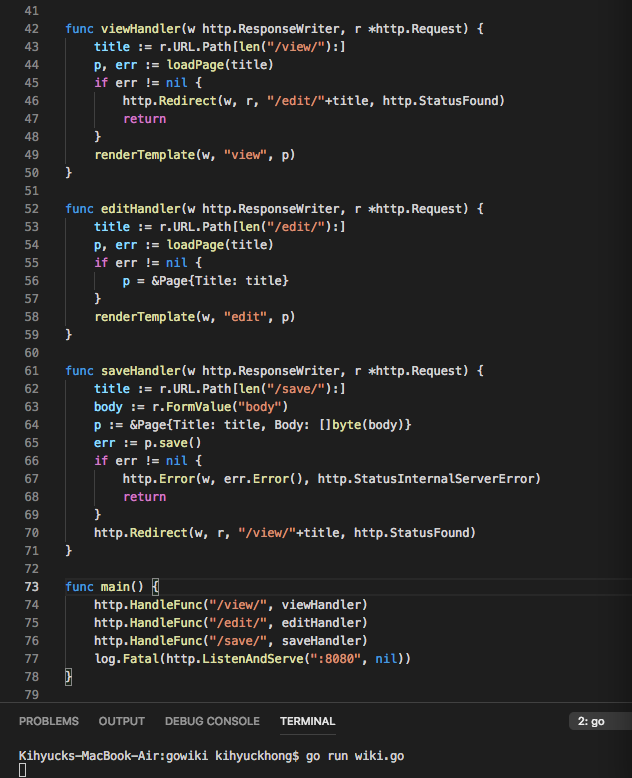GoLang Tutorial - Web App 5 (Error handling and template caching)
Continued from Web Application Part 4.
In this post, we'll be adding features such as Error handling and Template caching.
There are several places in our program where errors are being ignored. This is bad practice, not least because when an error does occur the program will have unintended behavior. A better solution is to handle the errors and return an error message to the user. That way if something does go wrong, the server will function exactly how we want and the user can be notified.
Let's handle the errors in renderTemplate:
func renderTemplate(w http.ResponseWriter, tmpl string, p *Page) {
t, err := template.ParseFiles(tmpl + ".html")
if err != nil {
http.Error(w, err.Error(), http.StatusInternalServerError)
return
}
err = t.Execute(w, p)
if err != nil {
http.Error(w, err.Error(), http.StatusInternalServerError)
}
}
The http.Error function sends a specified HTTP response code (in this case "Internal Server Error") and error message. Already the decision to put this in a separate function is paying off. The function template.ParseFiles will read the contents of html and return a t which is a type of *template.Template. The method t.Execute executes the template, writing the generated HTML to the http.ResponseWriter.
One more, we need fix up saveHandler so that any errors that occur during p.save() will be reported to the user:
func saveHandler(w http.ResponseWriter, r *http.Request) {
title := r.URL.Path[len("/save/"):]
body := r.FormValue("body")
p := &Page{Title: title, Body: []byte(body)}
err := p.save()
if err != nil {
http.Error(w, err.Error(), http.StatusInternalServerError)
return
}
http.Redirect(w, r, "/view/"+title, http.StatusFound)
}
There is an inefficiency in this code: renderTemplate calls ParseFiles every time a page is rendered:
func renderTemplate(w http.ResponseWriter, tmpl string, p *Page) {
t, _ := template.ParseFiles(tmpl + ".html")
t.Execute(w, p)
}
func viewHandler(w http.ResponseWriter, r *http.Request) {
title := r.URL.Path[len("/view/"):]
p, err := loadPage(title)
if err != nil {
http.Redirect(w, r, "/edit/"+title, http.StatusFound)
return
}
renderTemplate(w, "view", p)
}
func editHandler(w http.ResponseWriter, r *http.Request) {
title := r.URL.Path[len("/edit/"):]
p, err := loadPage(title)
if err != nil {
p = &Page{Title: title}
}
renderTemplate(w, "edit", p)
}
A better approach would be to call ParseFiles once at program initialization, parsing all templates into a "single" *Template. Then we can use the ExecuteTemplate method to render a specific template.
First we create a global variable named templates, and initialize it with ParseFiles.
var templates = template.Must(template.ParseFiles("edit.html", "view.html"))
The function template.Must is a convenience wrapper that panics when passed a non-nil error value, and otherwise returns the *Template unaltered. A panic is appropriate here; if the templates can't be loaded the only sensible thing to do is exit the program. Note that a panic typically means something went unexpectedly wrong. Mostly we use it to fail fast on errors that shouldn't occur during normal operation, or that we aren't prepared to handle gracefully.
The ParseFiles function takes any number of string arguments that identify our template files, and parses those files into templates that are named after the base file name. If we were to add more templates to our program, we would add their names to the ParseFiles call's arguments.
We then modify the renderTemplate function to call the templates.ExecuteTemplate method with the name of the appropriate template:
func renderTemplate(w http.ResponseWriter, tmpl string, p *Page) {
err := templates.ExecuteTemplate(w, tmpl+".html", p)
if err != nil {
http.Error(w, err.Error(), http.StatusInternalServerError)
}
}
Note that the template name is the template file name, so we must append ".html" to the tmpl argument.
Let's check our app again:

The code so far:


This file is available: wiki-app-5.go
Continues to Web Application Part 6 (Validating the title with a regular expression).
Go Tutorial
- GoLang Tutorial - HelloWorld
- Calling code in an external package & go.mod / go.sum files
- Workspaces
- Workspaces II
- Visual Studio Code
- Data Types and Variables
- byte and rune
- Packages
- Functions
- Arrays and Slices
- A function taking and returning a slice
- Conditionals
- Loops
- Maps
- Range
- Pointers
- Closures and Anonymous Functions
- Structs and receiver methods
- Value or Pointer Receivers
- Interfaces
- Web Application Part 0 (Introduction)
- Web Application Part 1 (Basic)
- Web Application Part 2 (Using net/http)
- Web Application Part 3 (Adding "edit" capability)
- Web Application Part 4 (Handling non-existent pages and saving pages)
- Web Application Part 5 (Error handling and template caching)
- Web Application Part 6 (Validating the title with a regular expression)
- Web Application Part 7 (Function Literals and Closures)
- Building Docker image and deploying Go application to a Kubernetes cluster (minikube)
- Serverless Framework (Serverless Application Model-SAM)
- Serverless Web API with AWS Lambda
- Arrays vs Slices with an array left rotation sample
- Variadic Functions
- Goroutines
- Channels ("<-")
- Channels ("<-") with Select
- Channels ("<-") with worker pools
- Defer
- GoLang Panic and Recover
- String Formatting
- JSON
- SQLite
- Modules 0: Using External Go Modules from GitHub
- Modules 1 (Creating a new module)
- Modules 2 (Adding Dependencies)
- AWS SDK for Go (S3 listing)
- Linked List
- Binary Search Tree (BST) Part 1 (Tree/Node structs with insert and print functions)
- Go Application Authentication I (BasicAuth, Bearer-Token-Based Authentication)
- Go Application Authentication II (JWT Authentication)
Ph.D. / Golden Gate Ave, San Francisco / Seoul National Univ / Carnegie Mellon / UC Berkeley / DevOps / Deep Learning / Visualization